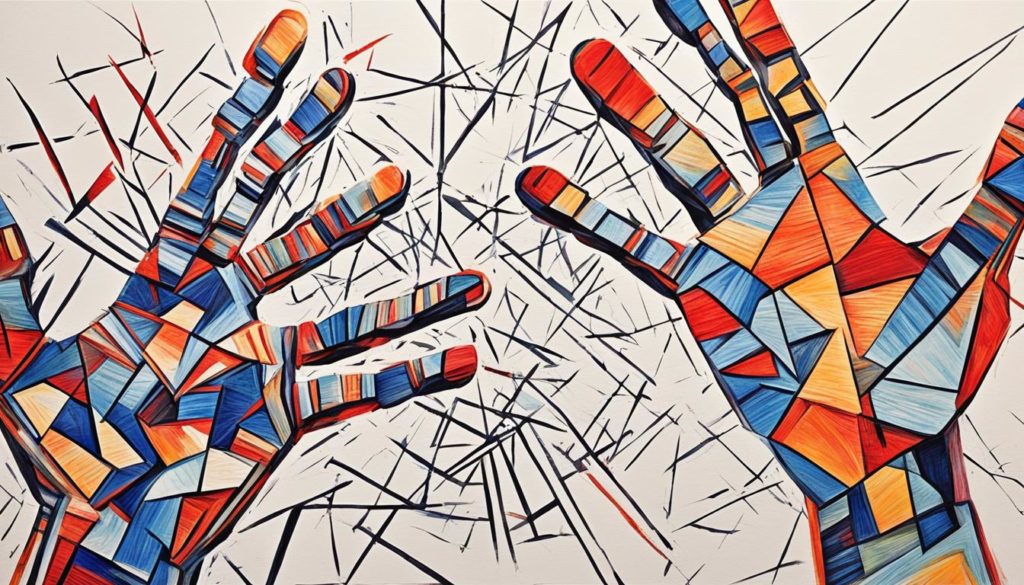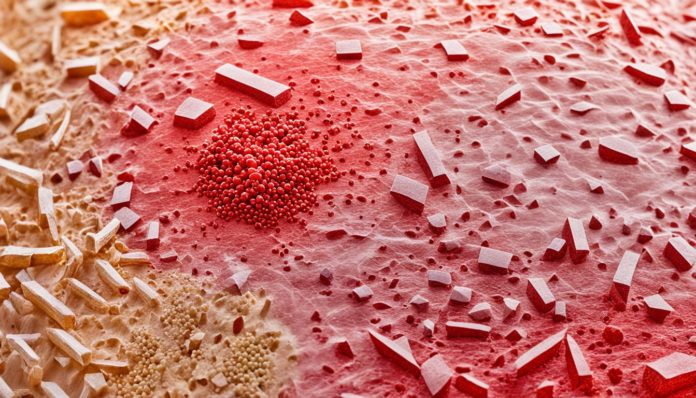Did you know about 31.6 million Americans live with eczema? It’s a common skin issue that leads to lots of itchiness. This shows how widespread skin problems are that make people scratch. Knowing causes of scratching skin conditions helps us treat and manage them better.
Conditions that make us scratch, like persistent itching, can really affect our lives. They range from slight annoyances to long-lasting skin issues. The reasons for itchy skin causes are many and often complicated. This guide looks deep into what causes these conditions. It helps us learn how to prevent and treat them.
Key Takeaways
- Scratching skin conditions are widespread, affecting millions in the U.S. alone.
- Understanding the etiology of itchy skin is key to effective management.
- Multiple factors contribute to skin health issues that cause persistent itching.
- Comprehensive knowledge of causes aids in prevention and treatment strategies.
- The impact of these conditions on quality of life is significant and often underestimated.
What Are Scratching Skin Conditions?
Scratching skin conditions cover many skin issues that make you want to scratch. This scratching can harm the skin. These issues can change your daily life and differ in how severe they are.

Eczema, psoriasis, and contact dermatitis are common conditions that cause itching. Knowing about these conditions is key to handling and treating them. This helps avoid more skin problems. Symptoms like redness, swelling, and lesions show up, so catching them early is key.
| Condition | Prevalence in the U.S. | Common Symptoms |
|---|---|---|
| Eczema | 31.6 million | Itchiness, red patches, dry skin |
| Psoriasis | 8 million | Scaly patches, joint pain, itching |
| Contact Dermatitis | 15 million | Rash, blisters, burning sensation |
Knowing about these skin conditions is important for spotting their causes and symptoms. These can depend on your surroundings, genes, and how you live. Acting quickly and getting the right treatment can manage irritation better. This improves life for those with these skin conditions.
Common Causes of Skin Irritation
Knowing why skin gets irritated is key to keeping it healthy. Many things can upset our skin, from the air around us to allergies. We’ll look at what causes these issues and how to fix them.
Environmental Factors
Environmental skin irritants play a big part in making our skin upset. Things like pollution, dirt, and harsh chemicals can break through our skin’s protection. This leads to redness and pain. Extreme weather can hurt too. Cold air makes skin dry, and too much sun can burn or harm skin over time.

City dwellers face these skin threats more often. Shielding skin with the right products and cleaning well can lessen their impact.
| Environmental Factor | Potential Effect | Skin Irritation Solutions |
|---|---|---|
| Pollutants | Inflammation | Regular Cleansing, Antioxidant Skincare |
| Cold Air | Dryness | Moisturizers, Humidifiers |
| Sun Exposure | Sunburn | Sunscreen, Protective Clothing |
Allergic Reactions
Allergies are another big reason our skin gets irritated. Our immune system might react too much to things like pollen, pet hair, or certain foods. This can make skin red, itchy, and swollen.
To handle allergic skin reactions, it’s important to know and avoid what causes them. Medications from the store and creams can ease the itching. A skin doctor can also help with custom advice.
Identifying Symptoms of Itchy Skin
Recognizing skin itchiness symptoms helps in dealing with underlying issues. People often feel mild irritation or severe discomfort. Look out for these symptoms when checking your skin:
- Redness and Inflammation: These show up first and alert you to other skin itchiness symptoms.
- Dry, Scaly Skin: This could point to eczema or psoriasis, especially if your skin has dry patches.
- Blisters or Bumps: These could mean an allergic reaction or infection, which needs quick action.
- Cracked Skin: Sign of extreme dryness, cracked skin can lead to more issues without itchy skin remedies.
- Swelling: Indicates a deeper problem, especially when seen with other symptoms.
Knowing these signs helps you find the right itchy skin remedies early. Seeing multiple symptoms together often gives a clearer picture of the problem.
Let’s compare common skin issues:
| Symptom | Potential Cause | Suggested Remedy |
|---|---|---|
| Redness and Inflammation | Allergic Reaction | Antihistamines |
| Dry, Scaly Skin | Eczema | Moisturizers |
| Blisters or Bumps | Infection | Topical Antibiotics |
| Cracked Skin | Severe Dryness | Hydrating Creams |
| Swelling | Inflammation | Corticosteroids |
By spotting skin itchiness symptoms and knowing what they mean, you can act fast. This ensures healthier skin and more comfort.
The Role of Allergic Reactions in Skin Conditions
Allergic reactions play a big role in many skin conditions. They’re often caused by things we run into day-to-day. Knowing what triggers these reactions and how they affect us is key to treating them.
Common Allergens
There are several common triggers for skin allergies. These include:
- Dust mites
- Pollens
- Animal dander
- Mold spores
- Foods like nuts, milk, and shellfish
Symptoms of Allergic Reactions
Spotting the signs of skin allergies is important for quick action. Symptoms can show up as:
- Red, itchy skin
- Hives
- Swelling
- Blisters
- Dry, scaly patches
Treatment Options
Dealing with allergic reactions involves several steps:
- Staying away from known allergens
- Taking antihistamines to help with symptoms
- Using creams to lessen inflammation
- Applying moisturizers to calm the skin
- Seeing an allergist for more tests and help
Understanding how common allergens link to skin allergy symptoms is important. It helps us create better treatment plans. And that means better health for everyone involved.
Understanding Scratching Skin Conditions
Scratching skin conditions cover various chronic dermatological conditions. These conditions make people scratch their skin a lot. They are more than small problems; they really impact lives. Knowing more about skin disorder awareness helps people handle their symptoms.
These disorders often need care for a long time. Some common ones are eczema, psoriasis, and lichen simplex chronicus. These all cause itching and scratching, which can harm the skin more.
It’s important to understand what causes these skin issues and what they mean. Factors include the environment, genes, and allergen reactions. Knowing all this is key to finding the right treatment.
| Condition | Primary Symptoms | Common Triggers |
|---|---|---|
| Eczema | Itchy, inflamed skin | Allergens, stress |
| Psoriasis | Red, scaly patches | Infections, alcohol consumption |
| Lichen Simplex Chronicus | Thickened skin, intense itching | Continuous scratching, rubbing |
Promoting skin disorder awareness helps everyone better grasp these conditions. Such awareness leads to better coping strategies. And that leads to a better life for those suffering.
Psoriasis: Causes and Symptoms
Psoriasis is recognized by red, itchy, and scaly patches on the skin. Understanding its causes and symptoms is essential for effective treatment. Tailored strategies are crucial for managing psoriasis symptoms effectively.
Causes of Psoriasis
Psoriasis stems from the immune system, genetics, and environmental factors working together. An excessive immune response can cause rapid skin cell production. This leads to thick scales and red patches.
Genetics play a key role, as the condition often runs in families. Stress, skin injuries, and certain infections can also make psoriasis worse.
Common Symptoms
Psoriasis can appear in many forms, with common symptoms including:
- Red patches of skin covered with thick, silvery scales
- Dry, cracked skin that may bleed
- Itching, burning, or soreness in affected areas
- Thickened or ridged nails
- Swollen and stiff joints (in psoriatic arthritis)
Management Strategies
Managing psoriasis requires lifestyle changes, medical treatments, and stress reduction. Here are some effective strategies:
| Strategy | Description |
|---|---|
| Topical Treatments | Corticosteroids and vitamin D analogues are applied to the skin to lessen inflammation and slow skin cell growth. |
| Phototherapy | Ultraviolet light exposure helps diminish psoriasis lesions. |
| Systemic Medications | Medications for the whole body treat severe psoriasis cases. |
| Stress Management | Meditation, yoga, and deep-breathing exercises can reduce stress, lowering the risk of flare-ups. |
| Dietary Adjustments | An anti-inflammatory diet may lessen symptom severity. |
Understanding psoriasis deeply is key to effective treatment. This requires a personalized approach to tackle this complex, lifelong condition.
Eczema: Triggers and Treatment Options
Eczema is a long-term skin issue that flares up because of different factors. Knowing what sets off eczema is key to control it. Things like allergens, stress, and changes in weather and humidity can trigger it.
There are many eczema treatment options to help soothe the skin and make life better for those dealing with it. These include medical treatments and simple home care tips:
| Treatment Type | Description |
|---|---|
| Topical Corticosteroids | Reducing inflammation and itching through prescription creams. |
| Moisturizers | Keeping the skin hydrated to prevent dryness and flare-ups. |
| Antihistamines | Alleviating itching caused by allergic reactions. |
| Phototherapy | Using light therapy to reduce inflammation and boost the skin’s natural disease-fighting properties. |
| Natural Remedies | Commonly include oatmeal baths, coconut oil, and aloe vera to soothe irritated skin. |
Besides these treatments, staying away from known triggers can really cut down on eczema outbreaks. Figuring out your own triggers, and sticking to a treatment plan, can really help. It leads to less skin rash discomfort and healthier skin overall.
Effective Remedies for Dry Skin Relief
Dealing with dry skin can be tough. However, several strategies offer relief. By following a regular moisturizing routine and focusing on hydration, your skin’s health can get better.
Moisturizing Routine
To fight dry skin, a consistent moisturizing routine is key. First, choose a moisturizer that fits your skin type well. Creams and ointments give more moisture than lotions.
- Morning: Apply a light moisturizer to keep your skin protected all day.
- Evening: At night, use a thicker cream or ointment to refresh and hydrate your skin.
Also, look for products with hyaluronic acid or glycerin. These ingredients help with skin hydration. For a good routine:
- Start by cleansing your face with a soft cleanser.
- Then, use a toner to balance the pH levels of your skin.
- Next, add a serum that goes deep for hydration.
- Last, apply the moisturizer you chose.
Hydration Tips
It’s also crucial to hydrate your skin from the inside. Here are some tips to boost your skincare routine:
- Drink Water: Try to drink at least 8 glasses of water each day for good hydration.
- Humidify Your Environment: A humidifier adds moisture to your room’s air, which is helpful in dry weather.
- Avoid Hot Showers: Use lukewarm water for showers. Hot water can remove your skin’s natural oils, causing dryness.
- Eat Hydrating Foods: Eating fruits and veggies with a lot of water, like cucumbers and watermelons, is beneficial.
By sticking to these moisturizing and hydration steps, you can manage dry skin better and find lasting relief.
Skin Rash Relief Solutions
Dealing with skin irritation can be tough. Thankfully, there are skin irritation solutions available. Over-the-counter creams with hydrocortisone are a good start. They lessen inflammation and soothe itchy skin remedies.
Another great rash treatment is using cool compresses on the rash. This can reduce the heat and discomfort of skin rashes. Also, use hypoallergenic moisturizers to prevent dryness and irritation.
Here’s a table comparing popular itchy skin remedies. It shows their key benefits and what’s in them:
| Remedy | Key Ingredients | Benefits |
|---|---|---|
| Hydrocortisone Cream | Hydrocortisone | Reduces inflammation, soothes irritation |
| Calamine Lotion | Zinc Oxide, Ferric Oxide | Cools and calms itchy skin |
| Aloe Vera Gel | Aloe Vera | Natural moisturizer, soothes burning sensation |
Oatmeal baths are a key home remedy for rashes. Adding ground oatmeal to warm water can comfort your skin. It helps with inflammation and makes your skin feel calm.
Eating a balanced diet helps too. Foods rich in omega-3 and antioxidants support skin health. They help your skin heal and protect against new issues.
Using these skin irritation solutions and rash treatment techniques can make a big difference. They help you control your symptoms and keep your skin healthy.
When to See a Dermatologist
Knowing when to see a dermatologist is key to keeping your skin healthy. A skin specialist gives care needed for tough or serious skin problems. Here’s when you should think about booking a visit:
- Persistent Itching: If itching doesn’t stop with store-bought treatments, see a dermatologist.
- Unusual Moles: Moles that change in color, size, or shape need a dermatologist’s look.
- Chronic Acne: If your acne won’t go away with regular treatments, a dermatologist can help.
- Rashes and Infections: If rashes or skin infections don’t get better, get them checked out.
- Hair and Nail Issues: Ongoing hair loss or nail problems also require a dermatologist’s care.
“Dermatological conditions, when treated early, can prevent more serious health complications.”
Getting a dermatologist consultation brings peace of mind and specialised treatment. Don’t ignore symptoms that stay or get worse. Seeing a skin specialist means getting the right advanced dermatological care. This helps your skin and your health.
Conclusion
To get healthy skin, you need to tackle it from many sides, especially if your skin itches a lot. We’ve talked about what causes itchiness, how to spot symptoms, and ways to treat it. Knowing why your skin itches, like reactions to certain body chemicals, helps manage it better.
It’s super important to figure out why you’re itching. Healthcare workers can choose the right treatment if they know what’s causing the itch. This makes it easier to keep your skin healthy. For more info on why itchiness happens, check out this link.
The best way to handle itchy skin is to understand everything about it. What triggers it, how it feels, and how to treat it. Everyone is different, so care needs to be tailored. Staying up-to-date and active in care helps both doctors and patients handle skin issues better.
FAQ
What causes scratching skin conditions?
Many things can cause itchy skin, like allergies, irritants, genes, and even autoimmune diseases. It’s important to know why to manage and prevent these issues effectively.
What are the common types of scratching skin conditions?
Eczema, psoriasis, dermatitis, and allergic reactions are common itchy skin conditions. They each have different symptoms and triggers, so their treatment varies.
How do environmental factors influence skin irritation?
Things like pollution, extreme weather, and chemicals can irritate the skin. Avoiding these irritants is key to keeping skin healthy and irritation-free.
What are the signs of itchy skin I should look out for?
Look for redness, swelling, dry skin, flaking, and the need to scratch a lot. Spotting these early can help you treat itchy skin quickly.
How do allergic reactions affect the skin?
Allergies can make your skin break out in hives, rashes, or swell. Staying away from triggers and using medicine can control these reactions.
What causes psoriasis and what are its symptoms?
Psoriasis happens when your immune system is too active, making skin cells grow fast. It causes thick red patches and itching. Treatments include creams, medicines, and lifestyle changes to lessen symptoms.
What are the main triggers and treatment options for eczema?
Eczema can flare up from allergens, irritants, stress, and the weather. Treatment ranges from moisturizers and steroids to advanced drugs, aimed at easing skin rashes.
How can I achieve dry skin relief?
For dry skin relief, keep a regular moisturizing schedule and stay hydrated. Use emollients, drink lots of water, and avoid harsh soaps to keep skin moist.
What are some effective solutions for skin rash relief?
Skin rash relief can come from creams, antihistamines, and natural remedies like aloe vera. Talking to a doctor can help with stubborn rashes.
When should I see a dermatologist?
See a dermatologist if skin problems persist, you notice sudden changes, or if it affects your life significantly. They can offer specialized care and tailored treatments.


